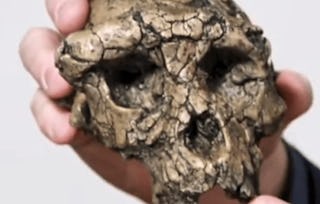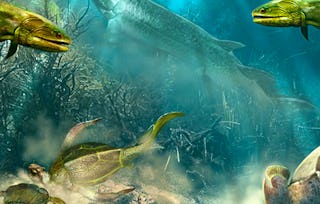This course will help you learn that the shapes of bones reflect adaptations and the behaviors that animals frequently participate in. Understanding this relationship is critical for reconstructing the activities of animals in the past. In this course, you will participate in two such activities. You will examine the femurs from a number of different species. You will also explore how footprint data is used to estimate the height of a species. You will participate in a dig at the Koobi Fora fossil site in Kenya. Furthermore, you will explore what a phylogenetic tree is and how they help in discovering the relative relatedness of a group of species. Virtually you will visit the Hall of Human Origins at the Smithsonian's National Museum of Natural History. This course will also help you understand the world of fossils. How fossils are formed, how paleontologists find fossils, how they are examined to find information will also be discussed here.

Ends soon: Gain next-level skills with Coursera Plus for $199 (regularly $399). Save now.

Inquiries Into Bipedalism
This course is part of Bipedalism: The Science of Upright Walking Specialization

Instructor: Jeremy DeSilva
Included with
Skills you'll gain
Details to know

Add to your LinkedIn profile
8 assignments
See how employees at top companies are mastering in-demand skills

Build your subject-matter expertise
- Learn new concepts from industry experts
- Gain a foundational understanding of a subject or tool
- Develop job-relevant skills with hands-on projects
- Earn a shareable career certificate

There are 3 modules in this course
This module provides an introduction to the human skeleton and explores the scientific usage of footprint data. It also takes you to some fossil sites. You also learn about the phylogenetic tree activity based on anatomy and genetics.
What's included
18 readings6 assignments5 discussion prompts12 plugins
This module explores the history of human evolution as seen in the "Hall of Human Origins" in the Smithsonian National Museum of Natural History.
What's included
10 videos1 reading1 assignment1 discussion prompt
This module provides an understanding of how and what we learn from fossils. You will also explore the history of human origin in South Africa.
What's included
7 videos1 assignment1 discussion prompt
Earn a career certificate
Add this credential to your LinkedIn profile, resume, or CV. Share it on social media and in your performance review.
Instructor

Offered by
Explore more from Basic Science
 Status: Free Trial
Status: Free TrialDartmouth College
 Status: Free Trial
Status: Free TrialDartmouth College
 Status: Free Trial
Status: Free TrialDartmouth College
 Status: Preview
Status: PreviewUniversity of Alberta
Why people choose Coursera for their career





Open new doors with Coursera Plus
Unlimited access to 10,000+ world-class courses, hands-on projects, and job-ready certificate programs - all included in your subscription
Advance your career with an online degree
Earn a degree from world-class universities - 100% online
Join over 3,400 global companies that choose Coursera for Business
Upskill your employees to excel in the digital economy
Frequently asked questions
To access the course materials, assignments and to earn a Certificate, you will need to purchase the Certificate experience when you enroll in a course. You can try a Free Trial instead, or apply for Financial Aid. The course may offer 'Full Course, No Certificate' instead. This option lets you see all course materials, submit required assessments, and get a final grade. This also means that you will not be able to purchase a Certificate experience.
When you enroll in the course, you get access to all of the courses in the Specialization, and you earn a certificate when you complete the work. Your electronic Certificate will be added to your Accomplishments page - from there, you can print your Certificate or add it to your LinkedIn profile.
Yes. In select learning programs, you can apply for financial aid or a scholarship if you can’t afford the enrollment fee. If fin aid or scholarship is available for your learning program selection, you’ll find a link to apply on the description page.
More questions
Financial aid available,

